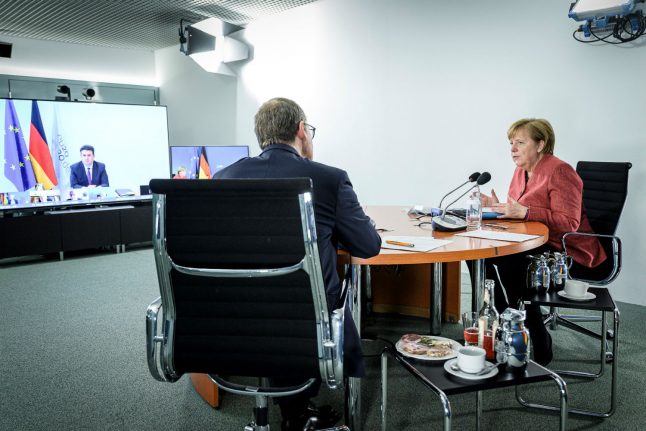During a video conference with Chancellor Angela Merkel of the centre-right Christian Democrats (CDU) on Monday, state premiers proposed that new federally-proposed coronavirus rules be made either less strict or voluntary.
The meeting came two weeks into Germany's lockdown light, which has seen restaurants, fitness centres and cultural institutions largely close, while most schools stay open.
In a draft resolution submitted to dpa, key proposals of the original draft are no longer included – or are formulated only as an appeal.
READ ALSO: What are Germany's planned new coronavirus restrictions?
For example, children and young people are no longer called on to only meet with the same friend in their free time.
Furthermore, people in Germany are “appealed” to, rather than required to, refrain from private parties altogether.
Mandatory masks at schools are also not included in the new resolution – which only mentions that everything possible should be done to keep schools open.
The negotiations also dealt with the question of whether the more extensive contact restrictions should be voluntary or made mandatory.
According to dpa, NRW Minister President Armin Laschet (CDU) said that contact restrictions – or public meetings with no more than 10 people from two households – could be very helpful in reducing the number of infections.
“We must broadcast together: The situation is serious”, Laschet said during the meeting.
A week later on November 23rd, German states are set discuss whether the rules for Germany’s partial lockdown will be extended or even tightened in December.
On Monday November 16th,10,824 new cases of infection were recorded within one day. This is a significant decrease from the previous Monday when 13,363 cases were reported by the Robert Koch Institute (RKI).
Keep in mind that the number of cases recorded is usually lower on Mondays, partly because less testing takes place at the weekend. There was a peak on Friday when 23,542 Covid-19 cases were reported.



 Please whitelist us to continue reading.
Please whitelist us to continue reading.
Member comments